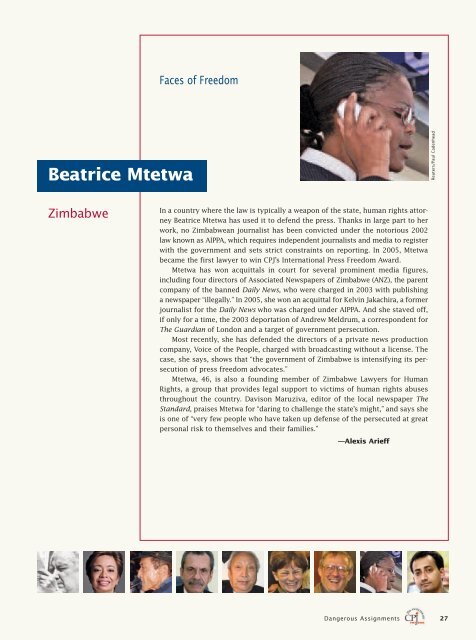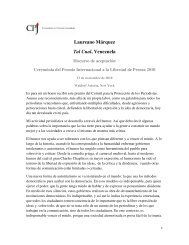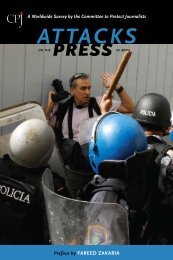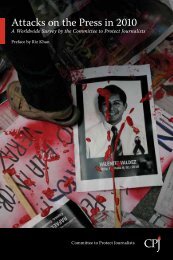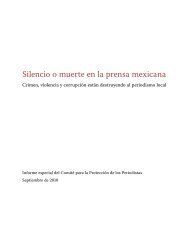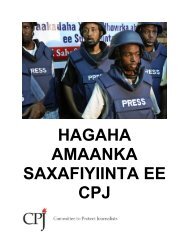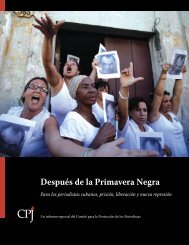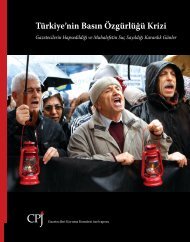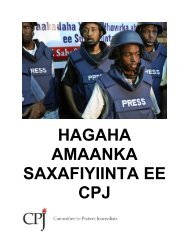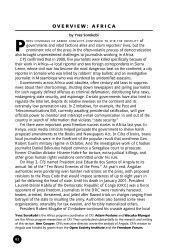Read the magazine online (PDF) - Committee to Protect Journalists
Read the magazine online (PDF) - Committee to Protect Journalists
Read the magazine online (PDF) - Committee to Protect Journalists
You also want an ePaper? Increase the reach of your titles
YUMPU automatically turns print PDFs into web optimized ePapers that Google loves.
Four on War<br />
A New Course<br />
War reporters must grasp his<strong>to</strong>ry, foreign policy, and humanitarian law.<br />
By Roy Gutman<br />
Roy Gutman, Newsday foreign edi<strong>to</strong>r, is winner of <strong>the</strong> 1993<br />
Pulitzer Prize for his reporting on human rights violations in<br />
Croatia and Bosnia-Herzegovina. Gutman has organized<br />
courses at Medill School of Journalism on war and terrorism,<br />
was co-edi<strong>to</strong>r of Crimes of War (W.W. Nor<strong>to</strong>n, 1998), and has<br />
just completed a book about 1990s Afghanistan.<br />
War is a school for journalists, but little hard-gained<br />
experience gets passed on o<strong>the</strong>r than around a bar<br />
or in <strong>the</strong> form of war s<strong>to</strong>ries. We should do something<br />
about this by setting up a standard curriculum <strong>to</strong><br />
train <strong>the</strong> next generation <strong>to</strong> tackle this worst of human<br />
cases. Not that every journalist should dodge bullets, but if<br />
a reporter has confidence in managing <strong>the</strong> ultimate journalistic<br />
challenge, everything else is a lesser case.<br />
Some lessons can be learned only at <strong>the</strong> scene, while<br />
o<strong>the</strong>rs require time and distance <strong>to</strong> digest. When I arrived<br />
in Beirut in 1982 during <strong>the</strong> first Israeli invasion, <strong>the</strong> foremost<br />
question was how <strong>to</strong> cross <strong>the</strong> Green Line <strong>to</strong> <strong>the</strong> Muslim<br />
west controlled by <strong>the</strong> Palestine Liberation Organization.<br />
Just go, don’t wait for o<strong>the</strong>rs, colleagues advised. One<br />
step at a time and feigning nonchalance, I traversed <strong>the</strong> noman’s<br />
land on a slow slalom around dirt barricades,<br />
destroyed cars, and heaps of rubble, no doubt many eyes<br />
and weapons trained on me. At three checkpoints no one<br />
challenged my U.S. press credentials. “Piece of cake,” I muttered<br />
under my breath as I boarded a taxi at <strong>the</strong> o<strong>the</strong>r side.<br />
Reporting on <strong>the</strong> ground during <strong>the</strong> Israeli siege was<br />
invaluable experience, but <strong>the</strong> lingering question, now apt<br />
as never before, could not be covered <strong>the</strong>re and <strong>the</strong>n. What<br />
did <strong>the</strong> war accomplish Looking back, we were covering<br />
<strong>the</strong> sound and light show, a war of high-tech fixes by <strong>the</strong><br />
militarily superior side and a less-than-bravura performance<br />
by a doomed Palestinian resistance.<br />
A quarter century later, as Israel again resorted <strong>to</strong> overwhelming<br />
force in response <strong>to</strong> deliberate provocation, <strong>the</strong><br />
question resurfaced as <strong>to</strong> how reporters can put it in<strong>to</strong> context.<br />
Not so easy a task for a new generation of journalists at<br />
a time when news organizations are retrenching in overseas<br />
coverage. Technology has vastly improved <strong>the</strong> ability <strong>to</strong><br />
transmit news, but <strong>the</strong> <strong>to</strong>ols for comprehending it are decidedly<br />
old-fashioned: an understanding of <strong>the</strong> his<strong>to</strong>ry of <strong>the</strong><br />
place and <strong>the</strong> ways of conflict, a grasp of <strong>the</strong> aims and strategy<br />
of <strong>the</strong> participants, knowledge of humanitarian law, and<br />
a willingness <strong>to</strong> ask questions until <strong>the</strong>re are factual answers.<br />
So this is <strong>the</strong> first <strong>the</strong>me of any curriculum—even more<br />
basic than training in how <strong>to</strong> survive a hazardous environment,<br />
<strong>to</strong> recognize weapons types, and <strong>to</strong> administer first<br />
aid. Reporters must grasp how force, if linked <strong>to</strong> clear,<br />
attainable goals, can serve foreign policy, and if not so<br />
linked, can undermine national security and kick <strong>the</strong> problem<br />
down <strong>the</strong> road.<br />
The wars over <strong>the</strong> breakup of Yugoslavia presented a<br />
different kind of challenge in <strong>the</strong> 1990s: gaining and<br />
keeping edi<strong>to</strong>rs’ interest while <strong>the</strong> U.S. government and <strong>the</strong><br />
foreign policy elite felt that Slobodan Milosevic’s rampage<br />
fell below <strong>the</strong> threshold of attention. The sound and light<br />
show—<strong>the</strong> air assaults on Slovenia and on Dubrovnik—got<br />
<strong>the</strong> public’s attention, but <strong>the</strong> real conquest was occurring<br />
in unfamiliar locales in Croatia. The relentless shelling of<br />
inland <strong>to</strong>wns, <strong>the</strong> slow capture of terri<strong>to</strong>ry by <strong>the</strong> Serb-led<br />
army, <strong>the</strong> installation of criminal regimes in <strong>the</strong> seized terri<strong>to</strong>ries,<br />
<strong>the</strong> expulsion of <strong>the</strong> civilian population, and <strong>the</strong><br />
destruction of its culture got, at best, minimal attention.<br />
Ei<strong>the</strong>r we failed <strong>to</strong> uncover <strong>the</strong>se s<strong>to</strong>ries or we did not tell<br />
<strong>the</strong>m in a compelling way.<br />
In <strong>the</strong> Bosnian war, <strong>the</strong> third of Milosevic’s four between<br />
1991 and 1999, atrocities against civilians became my central<br />
<strong>the</strong>me, and that helped put <strong>the</strong> s<strong>to</strong>ry on <strong>the</strong> map. But<br />
years later I realized that many of <strong>the</strong> crimes I reported in<br />
Bosnia had already occurred in Croatia—I just did not recognize<br />
<strong>the</strong>m as such.<br />
Visiting a hospital near Vukovar, where every window<br />
was shot out, every operating room destroyed, every Red<br />
Cross insignia used for target practice, I wrote about <strong>the</strong><br />
patients and <strong>the</strong>ir s<strong>to</strong>ries, <strong>the</strong> heroic doc<strong>to</strong>rs, and <strong>the</strong> plight<br />
of <strong>the</strong> Croatians. Yet I mentioned <strong>the</strong> destruction of <strong>the</strong> hospital<br />
only in passing. That this was a possible war crime <strong>to</strong><br />
be investigated did not occur <strong>to</strong> me. It turned out that five<br />
hospitals had been destroyed in much <strong>the</strong> same way at <strong>the</strong><br />
same time—a s<strong>to</strong>ry that would have made headlines had I<br />
and o<strong>the</strong>r journalists not missed <strong>the</strong> big picture. The realization<br />
that we had missed a dimension in our coverage led<br />
a group of journalists, among <strong>the</strong>m David Rieff and pho<strong>to</strong>grapher<br />
Gilles Peress, <strong>to</strong> produce Crimes of War, an A-<strong>to</strong>-Z<br />
guide <strong>to</strong> humanitarian law. The laws of armed conflict<br />
should be part of our <strong>to</strong>ol kit as reporters.<br />
O<strong>the</strong>r than in <strong>the</strong> Balkans, we in <strong>the</strong> media have rarely<br />
cast a powerful spotlight on war crimes, and certainly not in<br />
a timely way <strong>to</strong> draw attention <strong>to</strong> seemingly obscure, faraway<br />
wars. There is no clearer example than Afghanistan, where a<br />
war between homegrown nationalists and radical Islamists<br />
favoring regionwide revolution raged for five years with <strong>to</strong>o<br />
little on-<strong>the</strong>-ground reporting. “Small” wars turn out <strong>to</strong> be<br />
anything but small; just as war gave cover for <strong>the</strong> “Greater<br />
Serbia” chauvinists <strong>to</strong> carry out <strong>the</strong>ir concealed agenda <strong>to</strong><br />
destroy <strong>the</strong> Muslim presence in <strong>the</strong> sou<strong>the</strong>rn Balkans, o<strong>the</strong>r<br />
wars provide a cover for o<strong>the</strong>r national agendas.<br />
The Afghan internal conflict provided cover for Osama<br />
bin Laden <strong>to</strong> train militants and dispatch <strong>the</strong>m <strong>to</strong> destroy<br />
U.S. embassies, a Navy destroyer, and eventually <strong>the</strong> World<br />
Trade Center. The CIA and FBI were not <strong>the</strong> only institutions<br />
that failed <strong>to</strong> provide specific warning. The U.S. media<br />
never fully explained what had happened in Afghanistan<br />
after 1998: A terrorist with global reach had effectively<br />
hijacked a state. The moral is that seemingly obscure, faraway<br />
wars each contain <strong>the</strong> seeds of a much bigger war, of<br />
massive crimes against humanity, even genocide, and of<br />
chaos that will infect <strong>the</strong> region and <strong>the</strong> world. The wars <strong>to</strong><br />
watch are often <strong>the</strong> ones no one is covering.<br />
Today, journalism is under attack as never before and<br />
not just from <strong>the</strong> accountants at home. Foreign press<br />
credentials may be respected by factions in Lebanon, but<br />
not everywhere. In Iraq, <strong>the</strong> insurgents seeking <strong>to</strong> <strong>to</strong>pple<br />
<strong>the</strong> U.S.-backed government have made <strong>the</strong> media a major<br />
and direct target. Islamists in general see no need <strong>to</strong> accept<br />
news reporters in <strong>the</strong>ir professional function, except <strong>to</strong><br />
manipulate <strong>the</strong>m and <strong>to</strong> use <strong>the</strong> media platform for propaganda—and<br />
that greatly limits our ability <strong>to</strong> do our job. The<br />
long-term challenge in Iraq is <strong>to</strong> grasp <strong>the</strong> nature of <strong>the</strong><br />
conflict and <strong>to</strong> assess whe<strong>the</strong>r <strong>the</strong> U.S. military is using<br />
methods that will inflame or counter it.<br />
Journalism has gotten a lot harder as well as more dangerous.<br />
Training in force and foreign policy, laws of war,<br />
strategy and tactics, and <strong>the</strong> ways of insurgency will not<br />
bring better coverage overnight. But it might help us<br />
res<strong>to</strong>re purpose <strong>to</strong> our profession at a time of growing selfdoubt.<br />
We can use all <strong>the</strong> help we can get. ■<br />
Patients were forced <strong>to</strong> flee after a hospital came under attack in <strong>the</strong> Croatian <strong>to</strong>wn of Vukovar in November 1991.<br />
AP/Srdjan Ilic<br />
54 Fall | Winter 2006<br />
Dangerous Assignments<br />
55


